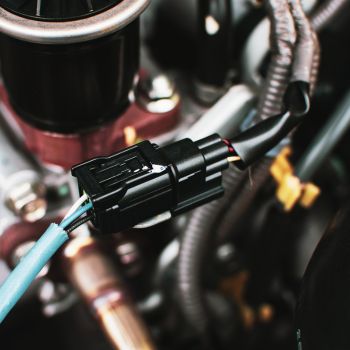 Today, sensors are everywhere in your car, monitoring everything from oil levels and tire pressure to engine performance, and sending this data to the Onboard Diagnostic Computer (OBD-II) located in the Engine Control Module (ECM).
Today, sensors are everywhere in your car, monitoring everything from oil levels and tire pressure to engine performance, and sending this data to the Onboard Diagnostic Computer (OBD-II) located in the Engine Control Module (ECM).
Just like any other part of your vehicle, sensors can be affected by wear, dirt, or electrical problems. These issues can lead to inaccurate readings, which in turn can impact how your car runs. Understanding how these sensors work and what to watch for can help you avoid bigger problems down the road.
How Car Sensors Work
The Engine Control Module (ECM) has been a key component in modern vehicles since the 1980s. It works closely with the OBD-II system to collect and interpret data from various sensors. This information helps the car adjust its performance, fuel efficiency, and emissions. Some of the most important sensors include:
- Oxygen Sensor: Measures the amount of oxygen in the exhaust gases. This helps the car maintain the right air-to-fuel ratio, which is crucial for both performance and emissions control. A faulty oxygen sensor can lead to poor fuel economy and increased pollution.
- Wheel Speed Sensors: Part of the Anti-lock Braking System (ABS), these sensors monitor the speed of each wheel to prevent skidding during braking.
- Mass Airflow Sensor: Measures the amount of air entering the engine. The ECM uses this data to determine how much fuel to inject for optimal combustion.
- Manifold Absolute Pressure Sensor: Monitors the pressure inside the intake manifold, helping the engine adjust fuel delivery based on load and altitude.
- Fluid Level Sensors: Keep track of oil, coolant, and other essential fluids, alerting you when levels drop below safe thresholds.
- Tire Pressure Sensors: Monitor tire pressure and notify you if it drops too low, improving safety and fuel efficiency.
Common Sensor Issues and Signs
Over time, sensors can become dirty, corroded, or damaged due to exposure to heat, moisture, and chemicals. Electrical problems or poor connections can also cause them to send incorrect data to the ECM. If a sensor isn't working properly, it can lead to a variety of issues, including:
- Check Engine Light: One of the most common signs that something is wrong. It could indicate a problem with one or more sensors, or even the ECM itself.
- Reduced Fuel Efficiency: A faulty sensor might cause the engine to use more fuel than necessary, leading to higher costs and more emissions.
- Engine Performance Problems: You might notice rough idling, hesitation, or misfires—signs that the engine isn’t getting the right mix of air and fuel.
- Overheating or Poor Acceleration: Inaccurate sensor readings can lead to improper cooling or inefficient combustion, resulting in overheating or sluggish acceleration.
If you're experiencing any of these symptoms and can't find the root cause, it's a good idea to have a professional check your vehicle. At DaSilva’s Auto Body, our technicians can run detailed diagnostic tests to identify sensor failures, ECM issues, and recommend the best course of action. Don’t let a small problem turn into a big repair—schedule a visit today and keep your car running smoothly!
High Quality Baritone,Entry Level Baritone,Professional Brass Material,High Quality Professional Brass Material
ZhengOu Musical Instruments Co.,LTD , https://www.zomusical.com